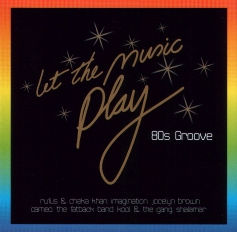Jason Maloney reviews
Various Artists
Sony TV 
Turn back the clock some 15 years (or more) and dance music was a rather different beast to the modern club sounds which have become such a prominent feature of today’s charts. House music had only just broken through from the Chicago underground scene when two of the most recent tracks contained on this double CD compilation were released in 1987.
House spawned Garage, Trance, Techno and – eventually – an amalgam of all four genres. The four-on-the-floor pounding rhythm – contemporary dance music’s signature nowadays – is notable by its absence among the 40 tracks on offer here.
Disco’s late-70s boom spilled over into the early 1980s, with elements of jittery electro beats and snippets of rap added into the melting pot as that decade wore on. In its garishly coloured outfits and afro-haired heyday, Disco was a major chart force, personified by the likes of Odyssey, Earth Wind & Fire, Kool & The Gang and Sister Sledge.
The music was often gloriously anthemic and uplifting, but let’s be honest, fashion-wise it was all horrendously naff. Those re-runs of TV performances from the era tend to detract from the enduring appeal of the music itself. Quite simply, it’s best heard and not seen. So, a collection such as this, gathering together dancefloor-fillers from the 80s across 2 CDs, is a perfect way to savour some of its finest examples.
There’s no chronology, and the tracks are mixed (sometimes rather cack-handedly) into one another, but it matters little. Even the presence of a single released in early 1990 (Got To Have Your Love by Mantronix), and several others which were hits in 1979 (among them Sister Sledge‘s He’s The Greatest Dancer and Earth Wind & Fire‘s Fantasy), can’t spoil the “80s Groove” effect. There are just too many seminal club classics featured on these two discs to let such things be of consequence.
Both CD1 and 2 have their share of highlights, and this compilation doesn’t tail off towards the end as they can often do. Indeed, the second half probably edges it in terms of widespread familiarity, with All Night Long (Mary Jane Girls), Get Down On It (Kool & The Gang), Walking On Sunshine (Rockers Revenge), Don’t Stop The Music (Yarborough & Peoples), I Found Lovin’ (Fatback Band) and Going Back To My Roots (Odyssey) likely to activate those aging memory cells.
However, disc two’s crowning moment has to be the timeless Ain’t Nobody by Rufus & Chaka Khan – a UK Top 10 hit twice over (#8 in 1984, #6 in 1989), as well as one of the most seductive and joyous records of all-time. More slinky, mid-80s club sounds in the form of Loose Ends (with their sublime Hangin’ On A String), Joyce Sims (the groundbreaking Kutris Mantronik electronic-disco creation All And All) and Dennis Edwards (Don’t Look Any Further, covered by The Kane Gang in 1987 and – more successfully – M People in 1993) offer proof that bubbling basslines are inherently funkier than the relentless pounding of post-House dance music.
Likewise the outstanding tracks on CD1 – Herbie Hancock‘s proto-electro instrumental masterpiece Rockit from 1983, Cameo‘s spooky, tongue-in-cheek 1984 hit She’s Strange (“..but I like it”), plus the club favourite from the summer of 1985, Twilight by Maze featuring Frankie Beverly (originally a B-side, but eventually flipped due to public demand), Shannon‘s electrifying Let the Music Play (after which this album is named, of course), Lisa Lisa & Cult Jam‘s I Wonder If I Take You Home (sweetly infectious and another benchmark release at the time) and D-Train‘s sleeper classic You’re The One For Me, which finally broke the Top 10 in 1985.
Towards the end of the 1980s, mainstream dance music was fragmenting into several different sub-genres. Nu Shooz‘s poppy I Can’t Wait (Top 3 in July 1986, and an American #1) gets a look-in on the first disc, as do a pair of tracks from 1987 – I Really Didn’t Mean It by Luther Vandross, and the pseudo-authentic white label scam Roadblock. The latter, a rumbustuous jam with stabs of brass and a chanted chrous, was a ruse that turned out to be the work of – shock horror! – Stock Aitken Waterman, and exposed many DJs as desperately sad individuals keen to appear hipper and more knowledgeable than their peers. The intial, info-free, 12″ slab of vinyl was claimed by some to be a long-lost piece of primetime 60s funk. No doubt they were the same people who thought Rick Astley‘s Never Gonna Give You Up was voiced by a coloured US soul singer.
Elitism has always been part of dance music culture, but thankfully Let The Music Play is an unashamedly populist and well-balanced snapshot of a genre that music has largely forgotten.
Review copyright © Jason Maloney, 2001. E-mail Jason Maloney
Check out Jason’s homepage: The Slipstream.
Reviewer of movies, videogames and music since 1994. Aortic valve operation survivor from the same year. Running DVDfever.co.uk since 2000. Nobel Peace Prize winner 2021.
